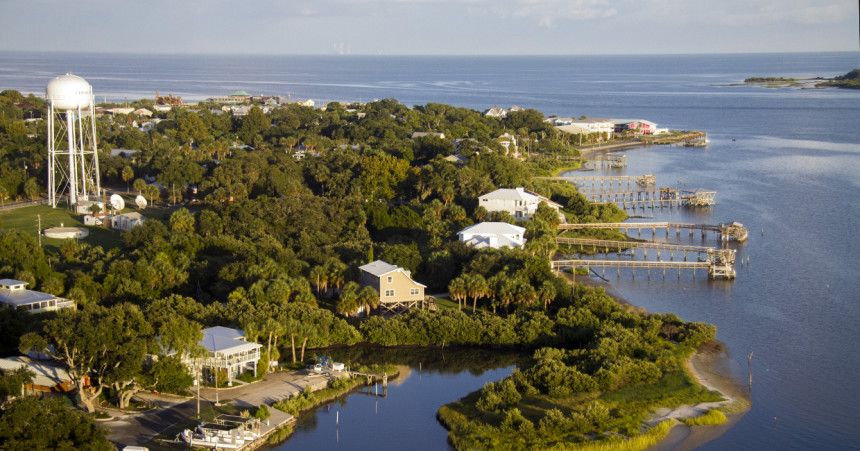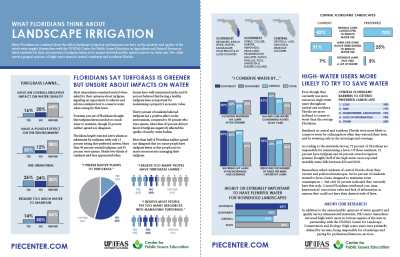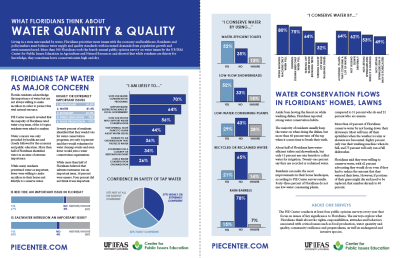
Floridians say the state’s water resources are just as important as healthcare and the economy, according to researchers from the UF/IFAS Center for Public Issues Education in Agriculture and Natural Resources.
PIE Center researchers presented 523 state residents with a list of 10 issues. Only two-tenths of a percent separated what the respondents tagged as the three most critical issues. When asked to describe the significance of each issue between “not at all important” and “extremely important,” 81.5 percent of Floridians deemed healthcare highly or extremely important, compared to water at 81.4 percent and the economy at 81.3 percent. Fifty-two percent of Floridians believed that water was an extremely important issue.
 The fourth-annual survey, administered by assistant professor Alexa Lamm, asked Floridians about the rights, responsibilities, attitudes and behaviors associated with water quantity and quality. Responses are weighted to be representative of the entire state, according to 2010 Census information.
The fourth-annual survey, administered by assistant professor Alexa Lamm, asked Floridians about the rights, responsibilities, attitudes and behaviors associated with water quantity and quality. Responses are weighted to be representative of the entire state, according to 2010 Census information.
“We’ve long known how significant water is to the state of Florida, and it’s great to see the public recognizes the importance of it as well,” said Lamm, a faculty member in the Department of Agricultural Education and Communication.
Floridians in the survey reported a high level of engagement in a variety of water conservation habits, but were more likely to save water indoors than in their home landscapes.
More than half of state residents use water-efficient toilets and low-flow showerheads, and at least three-quarters of Floridians run their dishwashers and washing machines only when they are full. But less than 30 percent indicated they used low-water consuming plants, reclaimed water or rain barrels in their landscape.
More than half of Floridians remained neutral when researchers asked if turfgrass lawns and landscape irrigation have a positive effect on the environment, which UF/IFAS senior vice president Jack Payne said signals an opportunity to educate and inform residents about how to conserve water when caring for their landscapes.
“These results demonstrate that Floridians are thirsty for knowledge about how they can conserve this vital natural resource,” he said. “This issue isn’t going away any time soon, and our public wants to be informed and engaged in water conservation.”
Aside from leaving the faucet on while washing dishes, Floridians reported strong water conservation habits.
The majority of residents usually keep the water on when doing the dishes, but more than 60 percent turn off the tap when it comes time to brush their teeth. About half of Floridians have water- efficient toilets and showerheads, but only 15 percent use rain barrels to collect water for irrigation. Twenty-one percent say they use recycled or reclaimed water.
Residents can make the most improvements in their home landscapes, according to PIE Center survey results. Forty-three percent of Floridians do not use low-water consuming plants, compared to 31 percent who do and 23 percent who are unsure.
Most will turn off their sprinklers when the weather is rainy or showers are forecasted. Fourteen percent of Floridians thought that turfgrass lawns needed too much water to maintain, though 56 percent neither agreed nor disagreed.
Floridians largely rejected native plants as substitutes for turfgrass, with only 13 percent saying they preferred natives. More than 40 percent wanted turfgrass, and 45 percent were unsure. Nearly two-thirds of residents said they appreciated when homes have well-maintained yards, and 54 percent believed that having a healthy turfgrass lawn is important for maintaining a property’s economic value.
Thirty percent of residents believed turfgrass had a positive effect on the environment, compared to 58 percent who were unsure. More than 60 percent did not know if turfgrass negatively affected the quality of nearby water bodies.
According to the statewide survey, 72 percent of Floridians are responsible for maintaining a lawn. Of those residents, 52 percent have turfgrass and 46 percent owned irrigation systems. Roughly half of the high-water users reported monthly water bills between $50 and $100.
Media contact: Alexa Lamm, alamm@ufl.edu, 352-392-6545 or Ricky Telg, rwtelg@ufl.edu, 352-273-2094.
Download the water infographic Download the turfgrass infographic Download the graphs


















